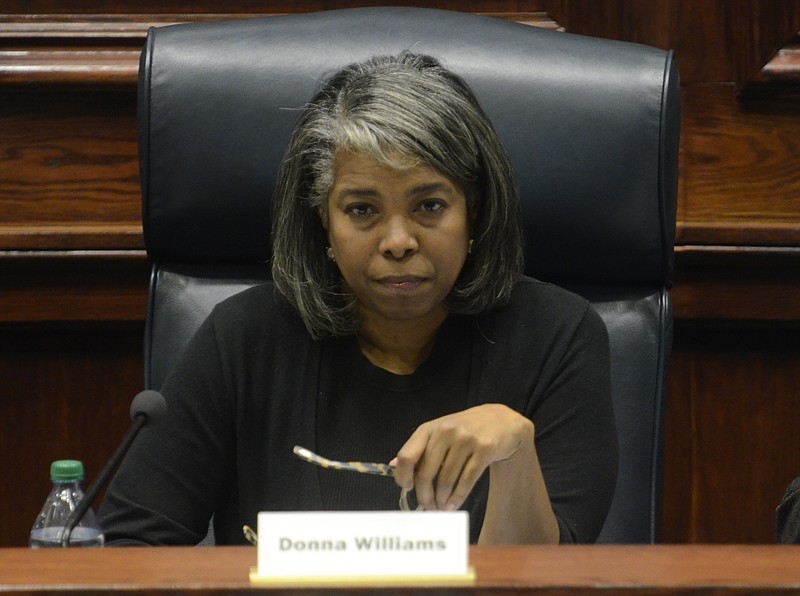Chattanooga leaders hope to boost affordable housing options across the city by means of a new tax break program for developers.
The plan, which has drawn critical scrutiny from local activists, comes up for a City Council vote Tuesday evening, after a same-day review by the council's Economic and Development Committee.
"This program will promote truly affordable housing in downtown and other parts of the city, and I'm proud of that," Councilman Chris Anderson, who is chairman of the committee, said in a phone interview Friday.
The plan was originally presented to the City Council for a Sept. 6 vote, but the council agreed to a two-week deferral after Accountability for Taxpayer Money, a citizen watchdog group, cried foul, citing lack of public discussion on program details. Mayor Andy Berke announced intentions to revise the current tax incentive program in July, but released few details at the time.
The Health, Educational and Housing Facility Board of Chattanooga will administer the 10-year program.
Members of the ATM group praised the new incentives in a City Council meeting the following week, but said the program needed to go further.
PAYING THE RENT
To qualify for the proposed payment-in-lieu-of-taxes (PILOT) incentive plan, developers must make at least half of their units affordable to renters who earn less than 80 percent of the area's median income. The rent must be no more than 30 percent of household income to qualify as affordable.
For a single person, the income cap would be $34,300, based on 2016 U.S. Department of Housing and Urban Development data, and the rent could not be more than $858.
The last PILOT program, launched in 2014 and administered by River City Co., only required developers to make at least 20 percent of their units affordable.
In a counterproposal emailed to council members, Helen Burns Sharp, a former city planner and member of Accountability for Taxpayer Money, called for setting the affordability threshold at 70 percent of median income, essentially capping rents at $751 instead of $858 for a single person.
"ATM believes that a rent of $860 a month is not affordable to a low-moderate income person," Sharp said in the email.
Donna Williams, administrator of the city's Economic and Community Development office, said HUD doesn't have a 70 percent income threshold.
The new program offers additional incentives for developers who price at least half of their units for people earning 60 percent of the area median income. Rent for a single person earning $25,725 would be capped at $643.
The PILOT requirement for at least half a project's units to be lower priced will attract developers who want to create affordable housing, Williams said.
Another way of looking at the affordable housing requirements is to define them as "income- restricted," Williams said.
"If you make more than affordability thresholds, you cannot rent those units," she said.
TAXPAYER BURDENS
The incentive for developers is a property tax freeze for up to 10 years on new construction and 14 years for rehabilitation of existing sites. This means they pay taxes equal to the property's value before new construction or renovation. Once the freeze ends, the full tax burden is phased in at 20 percent per year for four years. In all, a developer rehabilitating an existing site could get 18 years of tax breaks.
The City Council vote only accounts for Chattanooga property taxes. Hamilton County Mayor Jim Coppinger has said he would be willing to present proposed PILOT agreements for county commissioners to consider.
Sharp and other ATM members question whether the benefit from the PILOTs is worth the revenue loss to local government. In essence, they claim the PILOTs favor developers too much.
"Tax abatements raise both tax equity and social justice concerns," Sharp said in an email to council members. "Why should homeowners and small businesses pay their fair share of taxes and also pay for the service [fire, police, etc.] for these companies?"
Williams countered that ATM should talk to developers who do not apply for PILOTs, saying both real estate markets and incentives are very localized.
A developer has to offer between 20 and 50 affordable units to earn a four-year tax freeze. Developers who offer 50-75 affordable units earn a five-year tax freeze, and those who provide more than 75 affordable units can earn a six-year tax freeze.
Projects near public transit nodes or encompassing historic or rehabilitation work could qualify for two extra tax-freeze years, and units affordable to renters earning 60 percent of the median income could get an extra six years of frozen taxes.
ATM members also have called for developers to shoulder administration costs by charging application fees. They point to Knoxville and Memphis, which charge between $2,000 and $5,000 depending on the project investment.
The Chattanooga PILOT application costs $500, plus up to $2,500 for additional time and material expenses.
Anderson said he may offer an amendment to adjust the application fee Tuesday.
Franklin McCallie, a Southside property owner and ATM member, said in a recent meeting the issue comes down to "weighing the public good" with the right and need for developers to make a good living "while supplying to the citizens of this city places to dwell that they will be proud of and in which they - high income, moderate income, low income - can all participate."
Contact staff writer Paul Leach at 423-757-6481 or pleach@timesfreepress.com. Follow on Twitter @pleach_tfp.
